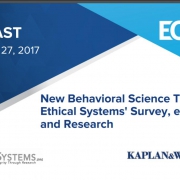Corporations Are More Insect than Person

In the 1982 film Blade Runner, the bioengineered human Roy Batty confronts his maker, Eldron Tyrell, the head of Tyrell Corporation, a biorobotics company based in the bleak and decrepit city of Los Angeles. The corporation manufactures human “replicants” for slave labor in colonies across the solar system. Batty is one of the best of Tyrell’s products, but he’s not designed to last. He’s come back to Earth, from an off-world colony, to ask for a longer life. But genetic engineering won’t allow it. “The light that burns twice as bright burns half as long, and you have burned so very, very brightly, Roy,” Tyrell tells him. “Look at you! You’re the prodigal son. You’re quite a prize.” Tyrell, almost sounding like an encouraging father, urges Batty to revel in the time he’s got left, and for that, Batty kills him, crushing Tyrell’s skull in his hands. But the Tyrell Corporation, of course, would live on, shaping the trajectory of society.
I thought of the Tyrell Corporation’s sordid influence on human affairs after reading a study published recently in Cognition about the psychology of corporate personhood, the legal notion that corporations are people. “Human traits are spontaneously attributed to the corporation, albeit to a lesser degree than for many animals. When a corporation displays more of these human qualities, it is granted more personhood,” write University of Pennsylvania psychologist Nina Strohminger and Yale University psychologist Matthew Jordan. “Furthermore, when assessing the rights and responsibilities due to the corporation, we use anthropomorphic criteria (possessing a mind and morality) to determine this eligibility.”
“We do appreciate that in some sense our conclusions are Kafkaesque: ‘Microsoft Corporation woke up one morning to discover it was a bug.’”
I was struck by the idea that in Blade Runner corporations apparently have the right to parent children. I wondered: Might this have been the result of corporate personhood being taken too far, or too lightly? It seems somewhat plausible, given the extent to which corporations are treated as persons today, having the ability to make contracts, hold property, sue and be sued, and, as a matter of free speech, spend money on political campaigns. The Tyrell Corporation’s business model—manufacturing and enslaving “robot” Homo sapiens for the sake of expanding humanity into space—might seem more natural or acceptable if people regard the company as having more personhood rather than less.
Or at least that’s what Strohminger and Jordan found in their experiments. They say the way companies behave, and how people talk about them, can affect how human they seem. Different businesses can be more or less anthropomorphized in the public eye. And crucially, this shapes how much we trust them. The researchers say their results, based on a series of five studies involving thousands of online participants, echo a “growing chorus of research that anthropomorphism increases moral care” for things like dogs and Teslas. “This basic insight can now be generalized to include moral care for corporations, in the form of legal rights,” they write. “Because anthropomorphism increases trust, it is possible that anthropomorphized corporations are deemed more worthy of rights precisely because they are more trusted.”
Strohminger, the paper’s lead author, is Assistant Professor of Legal Studies & Business Ethics at the Wharton School of Business. In her research, she aims to apply psychological insights to empirical business ethics. She has, according to her website, “conducted research on a wide variety of topics, including judgment and decision making, moral cognition, identity and the self, emotions, and fashion.” In her work, she can be playful and amusing. And she writes well. In the Acknowledgements section of her PhD dissertation, “The Hedonics of Disgust,” she offers a paean to Baltimore, the city that raised her, and its heroes—the poet Edgar Allen Poe, the essayist H.L. Mencken, and the filmmaker John Waters. “To think that pleasure only derives from the straightforwardly nice would mean leaving out a substantial piece of the human capacity for enjoyment,” she wrote. “I owe Baltimore, and its ragtag team of misfits, a great debt for this insight.”
In her recent paper with Jordan, she writes, “We do appreciate that in some sense our conclusions are Kafkaesque: ‘Microsoft Corporation woke up one morning to discover it was a bug.’” That’s one way of putting the fact that—despite the law treating corporations as people—people, on the whole, don’t find corporations very personable, or person-like. “Compared with other entities,” they found, “the average corporation is considered about as similar to a person as an ant.” Hence the pithy title of the paper, “Corporate insecthood.” “In a sense,” they write, “the corporation is less than the sum of its parts.” Humans, considered together as a corporation, are imagined to be something far less than human.
On Twitter, Strohminger said that “corporate insecthood” was one of several “idiosyncratic” lines she was sure would be cut by the journal’s editors. Another involved the pandemic. In 2018, when Strohminger began gathering data for this study, she had subjects rate the personhood of various animals, nonprofits, and corporations. Two of the corporations she happened to include were Pfizer and Johnson & Johnson, companies that would go on to make vaccines in response to the global spread of COVID-19. At that time, the researchers write, the virus was “still just a twinkle in a bat’s eye.”
The onset of the pandemic offered her a natural experiment. She already had data suggesting that “corporations that are seen as more morally good are also seen as more personlike.” So she couldn’t help but wonder: “Did the development of a vaccine by Pfizer and Johnson & Johnson improve their moral reputation (providing, as it would, an immense, once-in-a-generation societal good), and in turn, increase their perceived personhood?” To find out, she had over 1,000 online participants answer a questionnaire that probed their general understanding of the companies and “ended with a pointed question about awareness of the company’s vaccine.” She found that introducing a COVID-19 vaccine helped both Pfizer and Johnson & Johnson resist a trend during the pandemic that saw corporations lose some of their personhood.
What about the language in a company’s mission statement, and the nature of its stated ambitions? Do those affect how much legal personhood people think a company should have? Indeed. More mentalistic language, language that emphasizes human abilities like being curious and imaginative, scores corporations higher on personhood compared to language that doesn’t. Here’s a bit of the “high-minded” corporate language Strohminger put before almost 600 online participants: “Our goal is to think deeply, solve problems creatively, and exemplify the highest intellectual achievement in all of our endeavors.” (And “low-minded”: “The cornerstone of our mission is to use algorithms, machine learning, and other automated technologies…”) More moralistic and prosocial language—about environmental sustainability and community accountability, for example—also notches up personhood compared to mission statements that mention things like pursuing growth opportunities and profit maximization.
Subscribe to the Ethical Systems newsletter
If you have people take sides in a debate about whether corporations have minds and whether they, overall, act in a moral way, that can shift their intuitions on these points. As the researchers put it, “Inducing the belief that corporations have a mind, or are morally good, makes them seem more personlike.” Strohminger and Jordan were able to induce these beliefs by having subjects make arguments (the quality and coherence of which varied considerably). Here’s one pro-mind argument the researchers spotlighted:
Corporations definitely have minds. A person, or a group of people make up a corporation. A corporation could not exist without people present. People have minds, and those people make up corporations. For instance, NASA itself knows how to make a space shuttle, yet no single NASA employee knows exactly how. It is only as a collective corporation that the space shuttle can be built. Therefore, a corporation does, indeed, have a mind.
The arguments from subjects in favor of and against corporations being ethical overall were more predictable: They’re mostly immoral, because CEOs make unreasonably more money than underpaid frontline employees who often require public assistance, etc. Or they’re mostly moral, because companies are often philanthropic, and they provide their employees and their families with healthcare. On average, having to argue in favor of corporations having minds made subjects willing to grant more than one additional right to corporations. The result supports the idea, the researchers write, that “being seen as having a mind increases legal personhood not just for any reason, but because it is considered a personlike trait.”
Interestingly, having to argue in favor of corporations’ overall morality had a weaker effect. But that weaker effect went away in a follow-up experiment where Strohminger and Jordan had different subjects debate these same issues but about a different entity: an ant rather than a corporation. (In a footnote to this, Strohminger had another “idiosyncratic” line, saying, “The tedious process of coding these many hundreds of responses was performed by N.S., and she would like credit for the most mind-numbing sixteen hours of her life.”)
We are eager anthropomorphizers. Something deep in us is drawn to seeing ourselves in things quite unlike us. “Ants—an animal whose personal rights are seldom, if ever, discussed seriously—are afforded a boost in legal personhood when their mental and moral attributes are raised to salience,” the researchers write. “The similarity of these results to those on corporate personhood suggests that the basis for attributing personhood across disparate entity types is undergirded by highly overlapping cognitive processes. Whether judging the rights belonging to ants or corporations, people draw on the same well of qualifications: Does it have a mind? and, Does it have morality?”
It is, however, not always to the perhaps self-interested advantage of a corporation to be seen as more of a person. Seeming more like a person means seeming more accountable and responsive to punishment. Citing a 2018 study titled, “CEOs imbue organizations with feelings, increasing punishment satisfaction and apology effectiveness,” Strohminger and Jordan say that “imbuing corporations with anthropomorphic features induces harsher judgment when the corporation misbehaves, and amplifies the urge to seek retribution in the wake of scandal.”
In the year 2022, in the world of Blade Runner, it was something of a scandal when the Tyrell Corporation began making replicants that, unlike Roy Batty, could live a long human life. This stoked a series of violent rebellions, as we learn in the 2017 sequel Blade Runner 2049. People saw these new replicants as a threat to human existence, and began killing them en masse. But the replicants, viewing this as a form of genocide, banded together and succeeded in a plot to destroy Tyrell Corporation’s replicant registry, making it harder for replicants to be hunted down.
Replicants suffer from a clear case of dehumanization, which Strohminger and Jordan describe as “a kind of reverse anthropomorphization whereby they are denied human traits.” It’s true that replicants lack some of what many people might consider to be core human traits, like having a personality informed and shaped by a real childhood. Early replicant models could more readily be dehumanized, because of their social ineptitude and inability to carry on any kind of intimate or deep conversation. As the models got better, they benefited from memory implants that could foster more authentic-seeming emotional expression. It became harder to tell who was a replicant, so the use of the “Voight-Kampff test,” which involves a lie detector-like contraption that can read a person’s physiological signals, became necessary.
Ultimately, what the Blade Runner films—and the Philip K. Dick novel they were based on—do is underscore how flexible and cruelly arbitrary humans can be in deciding who, or what, is “human enough” to merit some measure of dignity. People are more and more sensitive now to the rights animals seem to deserve, based not only on their ability to suffer but also on their evident capacity, in the case of elephants and others, to feel wronged.
How do people feel about corporations? According to 2019 data from the Pew Research Center, most Americans, Democrats and Republicans alike, think they have too much power. Perhaps John Paul Stevens was right when he said, in his dissenting opinion over a decade ago in Citizens United, that the court’s ruling represented “a rejection of the common sense of the American people, who have recognized a need to prevent corporations from undermining self government.” Human psychology could, conceivably, limit just how much personhood—and the rights that come along with it— corporations get to enjoy. “In the eyes of the people, the corporation will never be as much of a person as an adult human, an infant, or even a dog,” Strohminger and Jordan write. Maybe that’s for the best.
Brian Gallagher is the Communications Director at Ethical Systems. Follow him on Twitter @bsgallagher.








